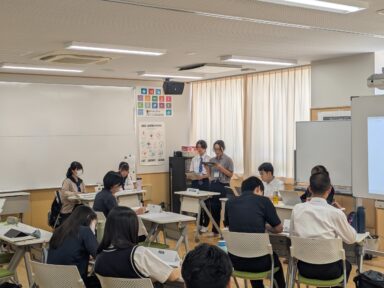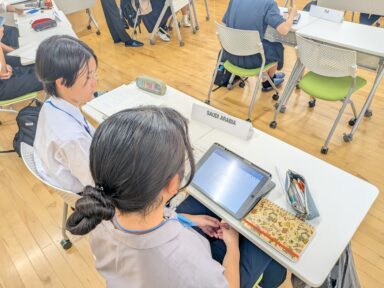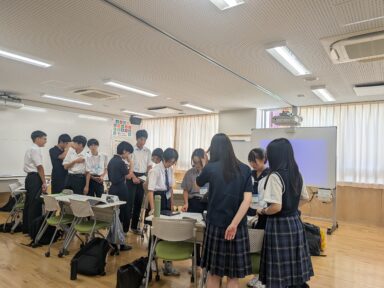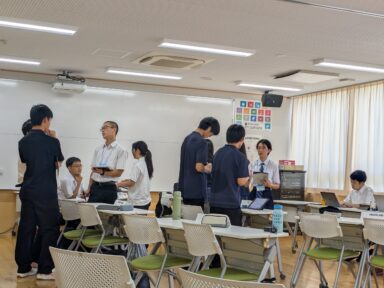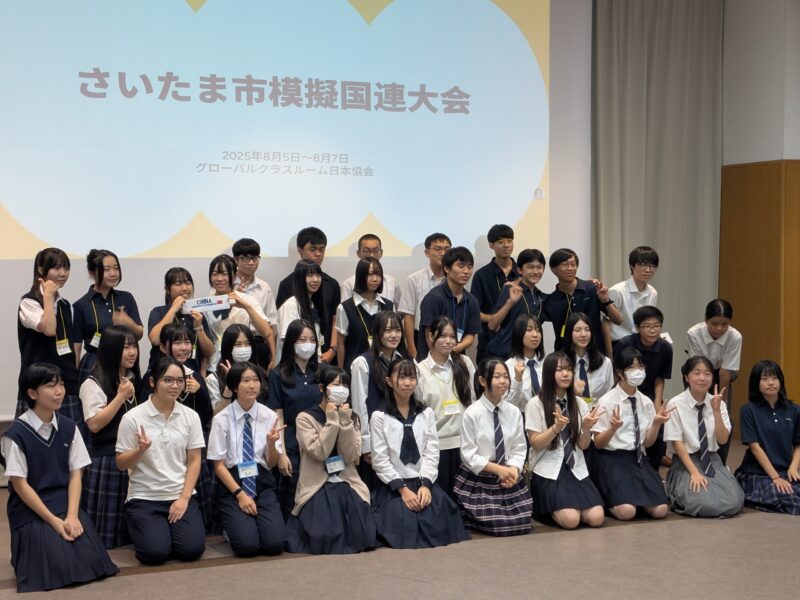ASPnet:さいたま市模擬国連大会に参加しました!
We participated in the Saitama City Model United Nations Conference!
2025年8月5日〜7日、さいたま市教育委員会主催のさいたま市模擬国連大会に参加しました。高校生が各国の大使になりきり、自国の特長をもとに世界をよくするための話し合い活動を行います。今回は、「地球温暖化」をテーマとして話し合いが行われました。
今年度から英語議場に加えて日本語議場も開設されました。本校の生徒はじっくりと考え、自分の意見を伝えたいということで、日本語議場を選択して参加しました。
<参加生徒>
1年:龍田 奈那、2年:浪江 沙耶加
事務局から割り当てられた国は、「サウジアラビア」でした。石油産出国としての立場を踏まえながら、地球環境にも配慮をしていくという姿勢の国です。石油の活用で経済が成り立っている国なので石油を使用しないという選択は難しいけれど、そのなかで地球環境への影響をどう抑えていくのか。それを他の国と協力しながら実現する方法はあるのか。参加した生徒は正解がないものについて、協議していく難しさや各国の環境に関する考え方を理解する難しさなどに触れながら3日間を過ごしました。
今回、日本語議場では再エネの活用で石油資源の使用を抑えることや二酸化炭素を減らすためには発電方法についても言及する必要があること、どのような政策にすれば多くの国に協力してもらえるのかなどが話題となりました。最終的には、自国の利害を考えたうえで合意形成をはかっていくプロセスを繰り返しながら、それぞれの国の立場で協力できることを模索し、最終的には全会一致の決議をすることができました。
運営側からは、「事前の準備が非常に良くされており、深い話し合いがされていた。話し合いのための知識が豊富だったので、各国の大使になりきることができていた。国を代表するという姿勢が見られ、国益を考えながらも地球規模の課題に向き合っていたことがよかった。相手へのリスペクトがある温かい議場だったことも全会一致につながる要素だったと思う。国連を模擬するプログラムとして深い学びをすることができたので、引き続き自身の考え方や生き方につなげてほしい。」と評価を頂きました。
On August 5-7, 2025,We participated in the Saitama City Model United Nations Conference hosted by the Saitama City Board of Education. High school students take on the roles of ambassadors from various countries and engage in discussions aimed at improving the world based on the characteristics of their respective nations. This year’s theme was “global warming.”
Starting this year, in addition to the English-language session, a Japanese-language session was also established. Our students chose to participate in the Japanese-language session, as they wanted to take their time to think carefully and express their opinions.
<Students>
1st grade: Nana Tatsuta, 2nd grade: Sayaka Namie
The country assigned to our school by the secretariat was “Saudi Arabia.” As an oil-producing nation, Saudi Arabia is committed to balancing its economic reliance on oil with environmental considerations. While it is challenging to reduce oil usage given the nation’s economic dependence on it, the discussion focused on how to mitigate environmental impacts and whether collaborative solutions with other nations are feasible. The participating students spent three days discussing the difficulties of reaching a consensus on issues with no clear-cut answers and understanding the environmental policies of other countries.
In the Japanese-language session, topics included the need to reduce oil consumption and carbon dioxide emissions through the use of renewable energy, the importance of discussing power generation methods, and what kind of policies would encourage cooperation from many countries. Ultimately, through a process of repeatedly seeking consensus while considering their own countries’ interests, they explored ways to cooperate from each country’s perspective and were able to reach a unanimous resolution.
The organizers commented, “The participants were very well prepared and engaged in deep discussions. They had a wealth of knowledge for the discussions, so they were able to fully immerse themselves in the role of ambassadors from each country. They demonstrated a mindset of representing their countries while also addressing global issues with their national interests in mind. The respectful and warm atmosphere in the meeting room was also a key factor in achieving unanimous agreement. As a program simulating the United Nations, it provided a deep learning experience, and we hope participants will continue to apply the insights gained to their own perspectives and ways of life.”

